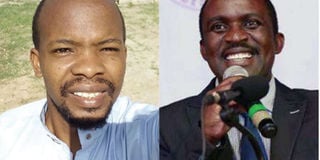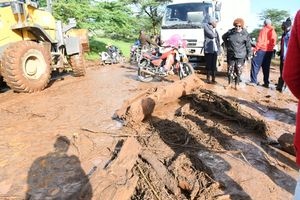Tanzania authors win Mabati-Cornell Prize

Tanzanians Dotto Rangimoto and Ali Hilal Ali who won have won the 2017 Mabati-Cornell Kiswahili Prize for African Literature. PHOTO | COURTESY
What you need to know:
- Ali Hilal Ali won the fiction category for his novel, Mmeza Fupa. The poetry award went to Dotto Rangimoto for his collection, Mwanangu Rudi Nyumbani.
- The judges said of Mmeza Fupa: “Rarely does one encounter a Kiswahili novel whose writer has exhibited the nuanced mastery of artistic language which naturally flows and without traces of artificiality."
- The winning entries are published in Kiswahili by East African Educational Publishers (EAEP) and Mkuki na Nyota Publishers.
- The best poetry book is published in English translation by the Africa Poetry Book Fund.
Two Tanzanian Kiswahili authors have won the 2017 Mabati-Cornell Kiswahili Prize for African Literature.
Ali Hilal Ali won the fiction category for his novel, Mmeza Fupa. The poetry award went to Dotto Rangimoto for his collection, Mwanangu Rudi Nyumbani. They both pocketed $5,000 (Sh500,000) each.
AWARD WINNERS
The winners of the third edition of the prestigious literature prize were announced online on January 15, 2018 by chair of the Board of Trustees, Abdilatif Abdalla. The awards ceremony followed in February in Nairobi.
In their jury, the judges described Mmeza Fupa as: “Rarely does one encounter a Kiswahili novel whose writer has exhibited the nuanced mastery of artistic language which naturally flows and without traces of artificiality. In Mmeza Fupa, the various characters – main and otherwise – convey and represent the different social strata, with their attendant historical, political, psychological, cultural, rural and urban environments and concomitant contradictions.”
“Although set on an imaginary island, the political novel is clearly speaking to what ails the African continent. Mmeza Fupa has opened a new door in this particular genre in Kiswahili Literature,” they added.
“In Mwanangu Rudi Nyumbani, one encounters seductive metaphors and imagery, effectively and successfully used in diverse Kiswahili poetic forms and styles while articulating concerns that have direct bearing to the human condition,” the judges noted.
“Dotto discusses weighty and serious matters but in a manner that doesn’t burden the reader. Instead he encourages one to keep on reading. He is a master of the craft. The volume is a great contribution to contemporary Kiswahili poetry,” they added.
WRITERS AND POETS
Ali is a budding Kiswahili novelist and poet. He was born in Kalani, Pemba, in 1989, and grew up in Wete, where he started his primary school education in 1997. He later received his secondary school education at the Islamic College, Micheweni, Pemba. Thereafter, he joined the Institute for Financial Management (IFM), Dar es Salaam, where he graduated in 2013 with a Bachelor of Science Degree in Social Protection.
Ali’s initial attempt in novel and poetry writing was in 2008. His first novel, Safari Yangu, was published in 2015 by Buluu Publishing, in Paris, France. He has also contributed several poems in an anthology by five poets, Diwani ya Kurasa Mpya.
Rangimoto, one of the upcoming Kiswahili poets, was born in Morogoro, Tanzania, in 1986. He completed his secondary education in 2004 at Morogoro Secondary School. Thereafter, he has been involved in small enterprise business and farming. He is a great enthusiast of Kiswahili literature, especially novels and poetry.
SHORTLIST
The other works shortlisted in the 2017 edition were Mbaruk Ally’s Hali Halisi (poetry); Hassan Omar Mambosasa’s Nsungi (fiction); Mwenda Mbatiah’s Kibweta cha Almasi (fiction); and Richard Atuti Nyabuya’s Umalenga wa Nyanda za Juu (poetry).
The 2017 winners were selected from 30 entries. The manuscripts were read by three judges — Ken Walibora Waliaula, the judge chairman, scholar and writer; Daulat Abdalla Said, assistant lecturer at the State University of Zanzibar (SUZA), and Ali Attas, Kiswahili and English teacher at the ministry of foreign affairs in Japan.
The overall 2016 fiction prize was won by Idrissa Haji Abdalla (Tanzania), for Kilio cha Mwanamke. The second prize went to Hussein Wamaywa (Tanzania), for Moyo Wangu Unaungua.
The overall 2016 Poetry Prize was won by Ahmed Hussein Ahmed (Kenya), for his poetry collection Haile Ngoma ya Wana.
The prize, founded in 2014 by Dr Lizzy Attree (Caine Prize director) and Prof Mukoma Wa Ngugi (Cornell University, USA), has the express goal of recognising writing in African languages and encouraging translation from, between and into African languages.
The $15,000 prize is awarded to the best unpublished manuscripts, or books published within two years of the award year, across the categories of fiction, poetry and memoir, and graphic novels.
PUBLISHING
The winning entries are published in Kiswahili by East African Educational Publishers (EAEP) and Mkuki na Nyota Publishers.
The best poetry book is published in English translation by the Africa Poetry Book Fund.
The prize is primarily supported by Mabati Rolling Mills of Kenya (a subsidiary of the Safal Group), and The Office of the Vice Provost for International Affairs and the Africana Studies Center at Cornell University.
Over 140 million people speak Kiswahili in Eastern and Southern Africa. Kiswahili is also one of the official languages in Kenya, Tanzania and Uganda.
According to the organisers of this prize, through some of the most prolific African writers and poets writing in Kiswahili, such as Shaban Roberts and Ebrahim Hussein there is a large body of work in Kiswahili that has long been a staple language in leading research universities for example, Nairobi University, Boston University and University of Wisconsin – Madison. In other words, Kiswahili is an established world language and should be considered as such.
“Moving from the principle that all languages are created equal and no one language should thrive at the expense of the other, we are proposing that a Kiswahili Prize for Literature be established with the express goal of promoting reading and writing in African languages. Literary prizes highlight fresh talent, encourage authors and demonstrate that reading matters,” they add.




